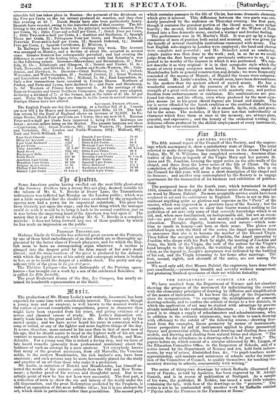33iiitstr.
The production of Mr. Henry Leslie's new oratorio, Immanuel, has been expected for some time with considerable interest. The composer, though a young man and an amateur, is well known to the musical world as the author of several remarkable compositions, graver in character than might have been expected from his years, and giving evidence of a severe and classical course of study. Mr. Leslie's disposition evi- dently leads him to the great and lofty in art. He is known only by his sacred music ; and we have never heard his name in connexion with a song or ballad, or any of the lighter and more fugitive things of the day. It seems, therefore, more natural in his case than in that of most men of his age, that he should aspire to tread in the highest walk of his art, and venture to measure his strength with that of Handel, Haydn, and Men- delssohn. For a young man this is indeed a daring step, and we have of late heard remarks (generally from professional musicians) about the boldness of such an attempt by a mere amateur. Yet everybody knows that many of the greatest musicians, from old Marcell°, the Venetian noble, to the modern Mendelssohn, the rich banker's son, have been amateurs ; and such persons may be more favourably placed for the study and practice of an art than those who make it a profession. Mr. Leslie, in imitation of Handel and Mendelssohn, has himself se- lected the words of his oratorio entirely from the Old and New Testa- ment; a further proof of his serious and thoughtful mind. But in an artistic point of view he has not been very successful. The first part, a a collection of texts to show the sin and misery of the world under the old dispensation, and the great Redemption predicted by the Prophets, is indeed an exposition of the most sublime ideas ; but it is too abstract for art, which deals in particulars rather than generalities. The second parts
which contains passages in the life of Chi ist, has some dramatic elements which give it interest. This difference between the two parts was evi- dently perceived by the audience on Thursday evening: the first part, though it contains the grandest portion of the choral music, went rather heavily ; the second, which includes the episode of the Widow of Nein formed into a fine dramatic scene, excited a warmer and livelier feeling. The performance was in St. Martin's HalL It was got up by a large committee of men of position both social and musical, and was given for the benefit of several charitable institutions connected with music- The best English solo-singers in London were employed; the band and chorus were complete and powerful; and Mr. Benedict acted as conductor. Ample justice was thus done to the work ; and, in so far as we could judge From the first hearing of music previously unknown to us, it ap- peared to be worthy of the manner in which it was performed. We can- not describe it as very original : it is in that composite style which the music of every young composer must betray. It bears strong marks of Mendelssohn both in general construction slut details; we were frequently reminded of the masses of Mozart ; of Handel the traces were compara- tively small. Mr. Leslie's studies, it would seem, have been devoted more to the modern than the ancient school of sacred music. He has a wonderful command of all the resoures of his art. He wields the strength of a great orchestra and chorus with masterly ease, and perfect freedom from embarrassment or confusion. His combinations are pro- found but clear, and his effects, even when produced by the most com- plex means (as in his great choral fugues) are broad and simple. The ear is never offended by the harsh crudities or the crabbed difficulties to which young composers are liable : all is smooth, facile, rich, and grate- ful to the sense. The melodies, if they have not that individuality of character which fixes them at once in the memory, are always pure, graceful, and expressive;, and the beauty of the orchestral writing, the delicious effects produced by the skilful employment of every instrument, can hardly be over-estimated.
































 Previous page
Previous page